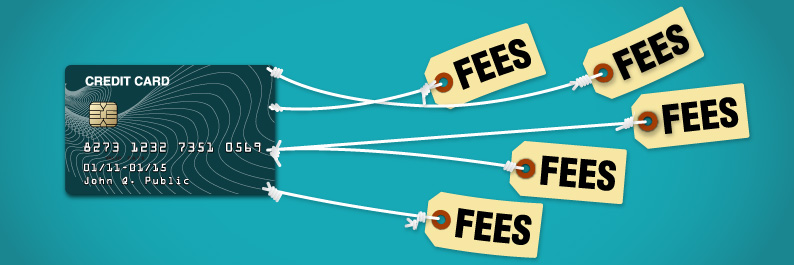
Business nationwide have been forced to pay excessive credit card fees for decades. Today this is no longer the case.
Merchant may now choose to pay 0%.
How is this possible?
A historic US Supreme Court ruling on March 29th, 2017 has now made it possible for merchants to ELIMINATE CREDIT CARD FEES.
This is real, it’s here, and it is a major victory for businesses.
Commerce Point Capital is on a mission to inform merchants about this new business development!
A proprietary software and terminal offered by Commerce Point Capital can facilitate the ELIMINATION OF CREDIT CARD FEES.
-
Credit Card Fees may be passed on as a percentage or a flat fee.
-
The fees are automatically calculated on the sales receipt at the point of sale.
-
The maximum allowable recovery percentage is 4% of the sales amount.
-
A Convenience Fee may set at a dollar amount of up to $5.
-
A specialized software program must be used to calculate the specific credit card fee to be printed on the receipt.
There are several reasons to recover credit card fees:
-
Credit Card Fees are Expensive. A 3.50% fee off the top of annual sales equates to 25% of bottom line profits for most businesses. For some low margin businesses, credit card fees can be as high as 50% of their gross profit!
-
EMV Chip Card Liability and PCI Compliance. In October 2015, the card issuing banks switched the liability for fraudulent card transactions to merchants. Previously, banks accepted all liability for fraudulent credit cards. This is no longer the case. Businesses take liability with every potential card transaction. It only makes sense for businesses to now cover the risk to reward trade off by recovering their credit card fees.
-
Cash Back and Rewards Cards. Over the last 5 years, card issuers have inflated credit card interchange fees on as high as 60% of credit cards accepted by businesses to give cash back and rewards to card holders, i.e. “2% Cash Back on All Purchases!” This is done without merchants even knowing they are giving cash back or rewards to a card holder. This is inequitable, and by recovering the fees charged on credit cards, it puts a business back in control of their business.
-
Fee Recovery Started with Government, Utilities, and Banks. The IRS, State Taxing Authorities, Municipalities, Hospitals, and Education Institutions were first allowed to recover their credit card fees. Card fee recovery is now available to all merchants and has leveled the playing field for all business types.
-
Card Holder Acceptance. The biggest fear merchants have is a customer complaint. Fortunately, there is very little negative response from card holders or complaints from customers when a business recovers their card fees. That is not to say there are NO complaints, but the complaints which have been surveyed are far and few between. Also, card holders do not have to pay card fees if they do not wish. Customers may pay with cash or check, and receive a discount.
-
The ARCO Fuel Company Example. Most people know ARCO gas stations (the Atlantic Richfield Company) and the transaction fee ARCO charges, typically $.35. ARCO is one of the most successful and profitable gas stations in America with a loyal customer following. The fees ARCO charges are acceptable and customers do not mind paying for the convenience. It is a win win. ARCO offers low pricing and customers happily cover the card transaction fees.
-
Cash is King! There are numerous advantages to encourage cash sales. Customers have the choice to pay with any form of payment they wish. By offering a discount for cash, this is a great way for a business to increase their cash intake and avoid costs associated with a non-cash transaction.
The US Supreme Court Rules in Favor of Merchant Surcharging Credit Card Fees
On March 29th, 2017, in a historic US Supreme Court ruling in the case of Expressions Hair Design vs Schneiderman, the court ruled in favor of a dispute between merchants and the State of New York in how credit card fees could be communicated. This case also served to settle similar cases which were under appeal in California, Texas, and Florida and conceivably any other state which had similar credit card fee laws. This equates into businesses now being allowed to recover their credit car fees.
The History of Credit Card Fees
In 1974, Congress amended the Truth in Lending Act to prohibit credit-card companies from contracting against discounts for non-credit-card transactions. Before the amendment, credit-card companies’ contracts with merchants regularly prohibited their either offering discounts for non-credit-card transactions, or imposing surcharges for credit-card transactions. The merchants and credit-card companies contracted to offer the same price for an item for all consumers, regardless of the manner in which they paid, and despite the “swipe fee” merchants incurred for credit-card transactions. Fair Credit Billing Act, Pub. L. No. 93-495, tit. III, § 306, 88 Stat. 1500, 1515 (1974) (codified at 15 U.S.C. § 1666f(a))
Two years later, while the authorization of discounts remained, Congress banned merchants’ use of surcharges, by again amending the Truth in Lending Act. Pub. L. No. 94-222, § 3, 90 Stat. 197 (1976) At the same time, Congress clarified the distinction between “surcharge” and “discount”, by defining them according to their ordinary meaning: a “discount” is “a reduction made from the regular price”; a “surcharge”, “any means of increasing the regular price to a cardholder which is not imposed upon customers paying by cash, check, or similar means”. Id. (codified at 15 U.S.C. § 1602(q)–(r)).
The federal ban on surcharges was allowed to expire in 1984. Interest Rate Control Act, Pub. L. No. 95-630, § 1501.
Upon the lapse of the federal anti-surcharge law in 1984, credit-card companies began reviving anti-surcharge clauses in their contracts with merchants.
Beginning in 2005, antitrust actions against credit-card companies challenged anti-surcharge prohibitions in their merchant contracts; the litigation resulted in Visa, Mastercard, and American Express’ removing those provisions in 2013.
In 2015, California and Florida US Federal Appellate courts decided in favor of business recovering the fees for credit card transactions:
California – Italian Colors Restaurant et al. v. Harris – Decided March 26, 2015
Florida – Bondi v. Dana’s Railroad Supply – Decided November 04, 2015
On March 29th 2017, the US Supreme Court unanimously ruled New York state laws restricting credit card surcharges and discounts violates the right of free speech and vacated a New York appellate court ruling which prohibited credit card surcharging. The effect of this Supreme Court ruling allows merchants to communicate and charge a price of their choosing which may include an increase for credit card fees. In Justice Roberts decision, the court gives clear guidance to all other states where such restrictions exist and upholds both the Florida and California decisions.
